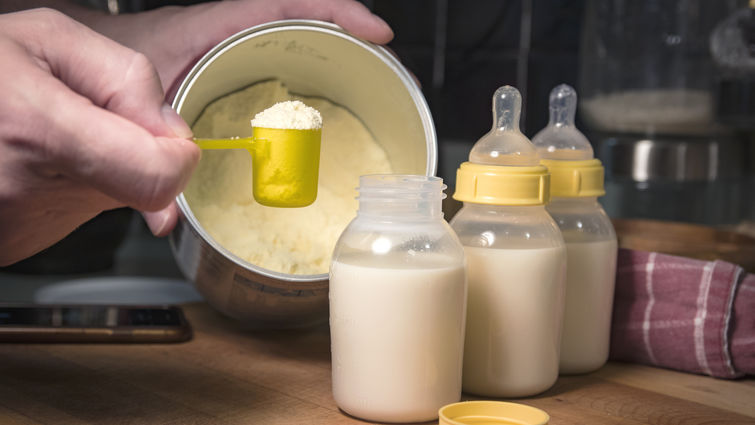
Many families nationwide are being affected by the current baby formula shortages that the American Academy of Pediatrics says “have been largely caused by supply chain issues and a recall of several contaminated baby formula products.”
While the U.S. Food and Drug Administration (FDA) says it’s working to address these issues as quickly as possible, pediatricians know the shortage is putting stress and strain on parents and their children in the interim.
Alexandra Clark, MD, division chief of general pediatrics for Loma Linda University Children’s Health, provides tips for parents feeling the impacts of the shortage.
- Do substitute brand name formula for generic formula
Clark says if you generally only feed your baby brand name formula, it’s okay to switch to the generic product. Whether generic or brand name, store-stocked baby formula is approved by the FDA and safe for your baby.
“If your baby is on a very specialized formula, speak to your pediatrician or specialist well before you’re going to run out of formula so we can help you find alternatives,” she says.
- Don’t try to make your own formula at home
While some “at-home” formula recipes can be found online, Clark warns parents not to try those methods based on the difference in formula composition and lack of safety precautions and testing by the FDA.
“Many babies are on mild specialty formula — for example, partially broken down, ones with added rice starch for reflux, etc. — and it’s safer to try whole protein soy or milk-based formulas than to make your own,” Clark says.
- Don’t dilute store-bought formula
Adding water to a purchased formula to help the product last longer could be unsafe for your baby. “It’s essential to follow the recipe on the container to ensure your child is receiving adequate nutrition,” Clark says.
- Don’t purchase formula from an unverified source
For example, don’t buy formula from online social media postings or individuals you don’t know. If friends or relatives are giving you formula they no longer need or are not using, check the expiration dates and ensure the product still has a factory seal.
- Do seek out trusted sources
Clark encourages parents to check local food banks and pantries to see if they have any formula in stock. Additionally, she says many pediatricians and family medicine provider offices have a small stock on site. “Reach out to your provider to see if they have formula,” Clark says.
“For those who have access to the Women, Infants, and Children federal assistance program (WIC), try to use that resource right at the start of the time window to avoid not finding formula when the benefit is about to run out,” Clark advises.
- For those who can, do try to breastfeed or use pumped milk for as long as possible
“If you have decreased milk supply, see your local WIC lactation specialist, a lactation specialist in the community, or your baby’s doctor to see what is available to increase your milk supply,” Clark says.
- Don’t switch to whole cow’s milk until the baby is approximately 12 months old
This is a recommendation by the American Academy of Pediatrics. “Some babies might be able to switch a few weeks earlier, but only make this switch early if it’s recommended by your provider who knows your baby’s health and growth,” Clark says.
Providers at Loma Linda University Children’s Health want to support you and your baby, especially during this stressful time. Make an appointment with a pediatrician to address your individual child’s needs. Additionally, the American Academy of Pediatrics’ website can provide helpful information.
